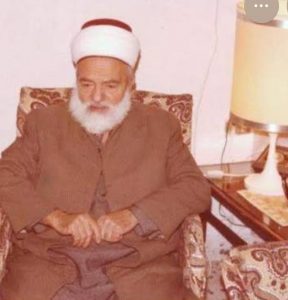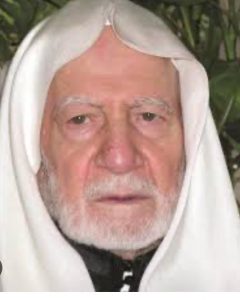On joining the Golden Chain
Shaykh Haytham’s speech at the Ijazah Ceremony for his students
Alhamdulillah. Some things never change. Twenty-five years ago, I delivered my very first course at the Muslim World League, and I am standing here again today…
Teaching has always been my passion, but not in English! Arabic is my language, and English was never my cup of tea. Yet Allah Almighty made things easy: He brought volunteers to serve His cause and appointed me as a servant in this path.
I still remember that first course. It was on the second floor. At that time, my English was limited to what I had learned in school: broken and very unprofessional. But I had to deliver a two-day course in English!
The brothers and sisters helping me worked tirelessly, translating the slides and preparing the materials. It took us two or three weeks just to finish them. I asked some of the students from Imperial and King’s College nearby, “What’s the best tool you use at university for lectures?” They said, “PowerPoint.” I said, “Bring me this PowerPoint and show me how it works.” They laughed, “It’s too complicated!” I said, “Just teach me how to make the first slide, and I’ll do the rest.” They were kind enough to help, and alhamdulillah, we managed to prepare the slides.
Then came the next challenge, delivering the course. The topic was Comparative Fiqh, something I had taught for years back home at the Islamic University of Lebanon. But to teach it in English was another story. The students suggested, “Just print your notes and read from them.” So I did, I printed the slides and read them again and again, trying to memorise the English terms. Islamic terminology in English is a language of its own; it’s not the same as everyday English. So I was facing a double challenge: the language and the terminology.
I told myself, If Allah wants this to happen, He will make it happen.
When the day came, I stood there with my printed pages. But as soon as I began, I realised, I couldn’t read from paper. Ever since I was seventeen, from my very first khutbah, I’ve never been able to read from notes. It just disconnects me. So halfway through, I began to improvise. The volunteers were shocked, “What are you doing?!” But subhanAllah, it was as if an angel was putting the words in my mouth.
When I finished, those who knew me said, “How did you manage that?” I honestly didn’t know. The English just flowed effortlessly. For me, that was a clear sign from Allah: He wants you to be here.
I had been thinking at the time whether to stay in the UK or return to Beirut, but that experience was the answer. Allah made my path clear, and He surrounded me with sincere people, allowing me to serve alongside them.
One of the things that I marvelled at was the variety of nationalities that I served. My students were Africans, Indians, Chinese, and so many others.
When Allah wants goodness for you, He opens the doors and eases the way.
This reminds me of the hadith of the Prophet ﷺ:
مَنْ يُرِدِ اللّٰهُ بِهِ خَيْرًا يُفَقِّهْهُ فِي الدِّينِ
“Whomever Allah wishes good for, He grants him deep understanding of the religion.” (Bukhari and Muslim)
There is no greater blessing in this world than to understand Allah’s message to you. Everything else is secondary. If you miss that, you miss everything. The Prophet ﷺ said,
إِنَّمَا أَنَا قَاسِمٌ وَاللّٰهُ يُعْطِي
“I am only a distributor, Allah is the true Giver.” (Bukhari and Muslim)
Knowledge, wealth, and blessings all come from Allah. The Prophet ﷺ was entrusted to distribute them justly, but the source is Allah Himself.
And so, when knowledge is distributed, each person receives according to their sincerity. Some people take buckets, others take drops, and some take nothing at all, not because of intelligence, but because of intention. Two students can sit in the same class: one excels while the other struggles. Often, the difference is not intellect, but sincerity.
The Prophet ﷺ also said that this Ummah will remain upon the straight path as long as it delivers justice and clings to knowledge until the Hour. The prophets and messengers did not leave behind wealth to be inherited, though many of them possessed wealth, rather, their inheritance is knowledge. Whoever inherits that has gained the greatest fortune.
إِنَّ الْعُلَمَاءَ وَرَثَةُ الْأَنْبِيَاءِ، إِنَّ الْأَنْبِيَاءَ لَمْ يُوَرِّثُوا دِينَارًا وَلَا دِرْهَمًا، وَإِنَّمَا وَرَّثُوا الْعِلْمَ، فَمَنْ أَخَذَهُ أَخَذَ بِحَظٍّ وَافِرٍ
“The scholars are the inheritors of the Prophets. The Prophets did not leave behind gold or silver; rather, they left knowledge. Whoever acquires it has gained an abundant portion.” (Abu Dawood, Tirmidhi and Ahmad)
To inherit knowledge is to inherit from the prophets themselves. That is why Imam Ahmad used to say: “Knowledge is like your rizq, your provision.” You must go out and seek it; it won’t come to you. Some will receive more, some less, but everyone must strive for their share.
Ibn Al-Mubarak said:
“The chain of narration (isnad) is part of the religion. If it were not for the isnad, anyone could have said whatever they wished.” (Muslim)
The Prophet ﷺ said:
إِنَّ الْمَلَائِكَةَ لَتَضَعُ أَجْنِحَتَهَا لِطَالِبِ الْعِلْمِ رِضًا بِمَا يَصْنَعُ
“The angels lower their wings for the seeker of knowledge, pleased with what he is doing.” (Dawood, Tirmidhi, Majah)
This means they ease his path and make his journey smooth. Those who have sincerely sought knowledge know this feeling, when Allah opens the way, when learning becomes light upon light.
When you decide in your heart that you want to understand the message Allah sent to you through His Book and His Messenger ﷺ, you are honoured, but also entrusted with responsibility. This is how our faith has been passed down: from Allah to the Prophet ﷺ, to the Companions, to their students, and so on, a continuous, unbroken chain.
And alhamdulillah, we are the only Ummah that possesses this sanad, this isnad, the unbroken chain linking us back to the Messenger ﷺ. No other nation on earth has it.
Our scholars have preserved this heritage through books and records called thabat, detailed registers of their teachers and chains. Some scholars had hundreds or even thousands of teachers, men and women alike. This isnad is what guarantees authenticity in every field, Qur’an, hadith, fiqh, Arabic grammar, calligraphy, all preserved through chains of transmission.
This is part of Allah’s promise:
إِنَّا نَحْنُ نَزَّلْنَا الذِّكْرَ وَإِنَّا لَهُ لَحَافِظُونَ
“Indeed, We have revealed the Reminder, and indeed, We will surely preserve it.” (Surah al-Hijr 15:9)
Preserving the Qur’an means preserving its explanation and application, the Sunnah. The Prophet ﷺ himself instructed his Companions to record his words. When one Companion said,
“O Messenger of Allah, we hear things from you but cannot memorise them,”
The Prophet ﷺ said,
اكْتُبُوا لِأَبِي شَاهٍ
“Write for Abu Shah.” (Bukhari and Muslim)
From that time onwards, the Sunnah was preserved in writing.
Alhamdulillah, through this isnad, the message of Islam has been protected and transmitted authentically across generations. Ibn Sirin commented that Isnad is part of the religion. Others also commented the same:
الإِسْنَادُ مِنَ الدِّينِ، وَلَوْلَا الإِسْنَادُ لَقَالَ مَنْ شَاءَ مَا شَاءَ
“The isnad is part of the religion; were it not for the isnad, anyone could say whatever they wished.”
(Muqaddimah Sahih Muslim and Taqyid al-ʿIlm by al-Khatib al-Baghdadi)
Among our students here, many have been studying and teaching for years, serving the knowledge in different ways. Today’s ijazah is an acknowledgment of their efforts and, insha’Allah, an encouragement for others to join this golden chain, to connect themselves to the Qur’an, the Sunnah, and the scholars of the ummah.
I remember the first ijazah I received from my Quran teacher, Shaykh Wasif al Khateeb (1908-1996), it was something very special, but it required a lot of hard work. Every day, after praying in jama‘ah, we would sit down and read our portions. We were not allowed to read from the mushaf, we had to memorise. You had to come, sit, and recite your lesson from memory.
Later, Shaykh Wasif introduced us to a shaykh in Damascus, Shaykh Muhammad Sukkar (1922-2008). Shaykh Wasif was the toughest shaykh I ever had. It took me around three years to finish the Qur’an with him, and alhamdulillah, I received my ijazah. When I went to Damascus afterwards, I was overwhelmed, the standard was very high, and I had to start again from zero. My new teacher, Shaykh Muhammad Sukkar, was ten times stricter. It took me nearly four years to complete the Qur’an with him, but alhamdulillah, I did.
To be honest, the first year with him was the hardest. He was a part-time imam and volunteer, and also a businessman who ran his own textile shop, so he would only teach at Fajr time and after Maghrib. When he went for ‘umrah, he appointed me to lead the prayers in his mosque, Muhiyideen bin Arabi, a huge honour, alhamdulillah. That experience was unforgettable.
What I want to say to you all is this: hard work, sincerity, and patience always pay off, insha’Allah. All you need is the right intention. Put your trust in Allah, and you will achieve what you never thought you could. Make the intention that you will seek closeness to Allah through knowledge, because the more we know Allah, the closer we become to Him.
Let’s remind ourselves and our children to walk this path, the path of knowledge, to be in the company of the angels. It’s the best company to keep. It’s easy and achievable, but it all depends on intention. Intention makes or breaks every action. That’s why the Prophet ﷺ said:
“Actions are judged by intentions.” (Bukhari)
So let’s purify our intentions and improve our actions.
We ask Allah, subhanahu wa ta‘ala, to make us facilitators of goodness and beacons of light. For those who have received their ijazah, remember: this is not the end, it is the beginning. You now carry a responsibility. You are the beacons of light. Take this knowledge and spread it, with authenticity, with the right understanding, with proper etiquette, and with sincerity.
May Allah accept our humble efforts, forgive our shortcomings, and help us strengthen our connection with Him and with the knowledge of His deen. I ask Allah to bless all of you, to increase you in knowledge, understanding, and closeness to Him.
Ijazah Ceremony 11th Oct 2025 at which Shaykh presented Ijazahs to the first batch of students who achieved it.



